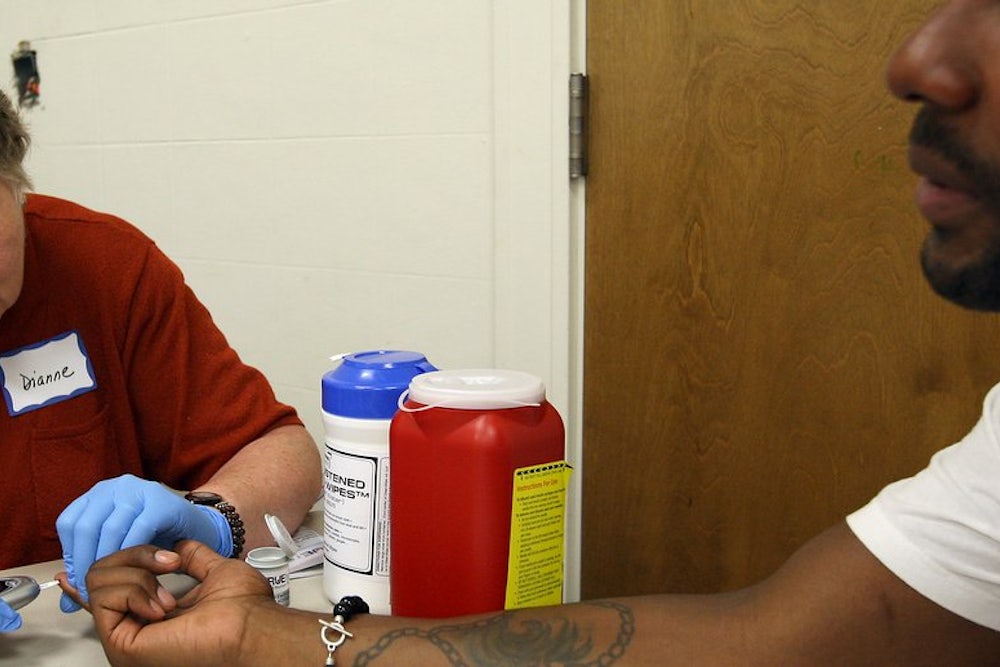Have nursing homes, fast-food restaurants, and other low-wage industries found a way to wriggle out of some Obamacare requirements? Maybe.
Today many (and possibly most) of these employers either don’t provide insurance or provide barebones coverage that doesn’t really cover much. Obamacare is supposed to change that. When its big coverage provisions take effect in January, employers with more than 50 employees are supposed to provide real insurance—or pay a stiff penalty. But some employers and insurers may find a way to avoid facing that choice: They’d offer “skinny” insurance, similar to the barebones policies some of them now offer, and then pay a more modest penalty. It’s not yet certain, because the administration has not finished writing the regulation about what coverage employers must provide—and what happens if they don’t. But the law itself doesn’t seem to leave much flexibility here. (As always, the best source for the legal details is Timothy Jost, the law professor at Washington and Lee University.)
A story in Monday’s Wall Street Journal quoted officials from several companies who said they were considering this approach, although, as always, that could be bluster. Among other things, these companies would have to consider the competitive effects, which could push in either direction. Do they provide less insurance, so they keep costs lower? Or do they provide more, so they can attract better workers? Different companies will undoubtedly respond in different ways, although, for the moment, administration officials say they have not seen signs many companies will really opt for the barebones approach.
For the most part, the workers at these companies would not be worse off than they are now, no matter what the companies decide—because these are predominantly low-wage workers who already don’t get decent coverage at work. Under Obamacare, at least, they’d have an option they never had before: the ability to buy subsidized, regulated insurance in the new exchanges. It’s not an option they’d all choose: Some might opt to stick with the cheaper company plans, however lousy. But others would jump into the exchanges and, finally, get decent insurance.
Still, the situation is far from ideal. There is, for example, the danger that only sicker workers jump into the exchanges, changing the actuarial balance and nudging premiums up. And if you’re wondering why the law even allows employers to do this, the simple answer is that employers have lobbyists. As John McDonough wrote in Inside National Health Reform, and told me on Monday, many of the law’s sponsors felt they could not get the bill through Congress without support from at least one key employer lobby. That gave a lot of leverage to the Business Roundtable, the least hostile of the business groups, and that group—along with every other employer group—made loose requirements on employers a priority. “Justified or not, there was a belief among the key movers that the loss of [the Business Roundtable] would be a tipping point with several Democratic senators whose support was essential for package,” said McDonough, who worked for the late Senator Ted Kennedy on the Health, Education, Labor and Pensions Committee staff.
To many policy wonks, left and right, the ideal solution would be to get employers out of the insurance business altogether. But that’s not the solution most Americans want. In fact, any reform that threatens to change the coverage Americans already have is bound to run afoul of public opinion—even if it’s a change for the better. That’s one reason Obamacare’s treatment of employer coverage is so complicated and so full of loopholes. The law is trying to set higher standards for what employers provide, but without causing such disruptions that employers drop coverage altogether. It’s a nearly impossible task, but one reformers must attempt until the country is ready for bolder action.
Jonathan Cohn is a senior editor at The New Republic. Follow Jonathan on Twitter @CitizenCohn
